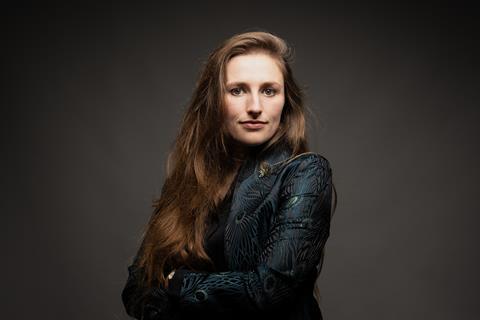Following the release of her book Quartet, Dr Leah Broad talks to Ruth Hallows about the reasons why women have had to fight harder to have their works performed

Discover more Featured Stories like this in The Strad Playing Hub
For years, women have been fighting for their music to be recognised as equal to that of their male counterparts, battling against societal expectations and gendered prejudices to make their compositions speak for themselves. But today the stories of four women almost lost to the footnotes of musical history sit proudly on the coveted window display of Daunt Books, Marylebone. This is thanks to the efforts of one of their biggest advocates, Leah Broad.
The award-winning public historian released her first book, Quartet, this week. It is a group biography of four composers: Ethel Smyth, Rebecca Clarke, Dorothy Howell and Doreen Carwithen.
For Broad, the decision to write about Smyth, Clarke and Howell was non-negotiable as they were the leading women composers of their time.
‘You can’t really write the history of British music without talking about Ethel Smyth,’ she says. ’It’s been done before, and I strongly disagree. She’s so important for understanding the turmoil at the turn of the century musically.’ But when it came to choosing the fourth member of the quartet, for Broad it was more of a question of who to leave out.
‘I wanted to write about composers whose music I felt I could unapologetically advocate for,’ she says. Carwithen, born in 1922, was a film composer, unusual for women of her day. ‘I want to show that there’s a precedent. There was a woman writing music for films in the 40s and 50s and she was incredibly successful at it.’
Broad has dedicated a large amount of time getting to know the lives of these four women and the obstacles that constantly stood in their way. The double standard these women faced post-graduation is exasperating. Broad tells of women who continually have doors shut in their faces due to their sex: ’publishers who claim that music by women doesn’t sell, production companies who won’t put on performances by women. These are women who have no option but to self-publish and privately fund performances, only to have critics dismiss their work for being ”too ambitious for a woman”, or ”too feminine” or not feminine enough.’
‘There are so many intersecting issues that women composers have to face,’ says Broad. ’If I had to narrow it down we’re looking at gendered criticism and attitudes. First and foremost, women have always been judged by their sex.’
This pre-conceived assumption about women composers was dragged into the spotlight in 1919 when Clarke won second prize for her Viola Sonata in a competition where submissions were anonymous. Her submission was so good that critics initially assumed it was written by a man.
Read: In Our Shoes: What does it mean to be a woman in music in 2022?
Discover more Featured Stories like this in The Strad Playing Hub
For Broad, it’s an issue that is still happening a hundred years later. Donne, Women in Music is a charitable foundation dedicated to achieving gender equality in the music industry, and it claims 7.7 per cent of orchestral music currently performed worldwide is composed by women. Broad suggests a look into the statistics behind the numbers too: ‘I think we need to look very hard at how we programme music by women. If all the pieces you’re playing by women are short pieces around International Women’s Day, that’s tokenism. Don’t do it.’ Instead, Broad advocates considering how we programme music by women, giving it the same care and attention that we automatically afford music by men.
In 2016, Broad was selected as a BBC New Generation Thinker and in a Sunday Feature last year for BBC Radio 3, Hidden Women and Silenced Scores, she discussed the expectation that women composers would write songs and not attempt the bigger works. For many of us, our first exposure of repertoire by women comes from chamber music through works like the Clarke’s Viola Sonata or Smyth’s Cello Sonata in A minor and Howell’s The Moorings for violin and piano. There’s a reason for that: ‘Chamber works are easier and cheaper to perform than orchestral works,’ Broad argues. ‘You don’t need an opera house complete with an entire company and enormous chorus - as you do with Ethel’s bigger works. You just need two exceptional musicians.’
So why now? Why are the lives and works of these four women so important to uncover and celebrate? Broad puts it down to two reasons. ‘You don’t have to like all pieces of music, but I think it’s damn important you have the option to make up your own mind,’ she says. ’There’s so much incredible music out there that we don’t have the opportunity to explore because it’s not been published.’ In recent years all of Clarke’s music has been published but there are gaps with the others.
But it’s the second reason where Broad’s passion and ardour for the cause become evident. ‘If it was true that music history had been written exclusively by men, I’d be fine writing about Beethoven all the time, but the truth is we’re making an active choice to write women out of music history.’
Although women have been composing for centuries, their works have often been forgotten or credited to a male relation. Broad stresses the importance of role models, for every female musician to acknowledge precedent and predecessors, and know they’re not forging a path in unknown territory. ‘All these women have been hailed as the first to do x, y or z. Sometimes they really were the first. Sometimes they weren’t.’
Smyth, often hailed as the first woman to write an opera, was actually following in the footsteps of Francesca Caccini over two hundred years earlier. ‘As long as women are the first or only, they cannot be the favourite or the familiar,’ says Broad.
For Broad, understanding more about the women who came before us is the only way that women’s works will be performed, written about, and ultimately remembered. However, accessibility remains a barrier yet to be eliminated.
Marginalised music remains in the shadows, because acquiring scores and performance rights is expensive for orchestras and ensembles looking to broaden their programming, especially when the works of their more established counterparts can be obtained much more readily and cheaply.
But Broad is optimistic for change: ‘It’s now getting quite difficult to use the excuse “I just didn’t know.” But I think we need to get to the point where it’s impossible to have any kind of excuse for not having women in programmes and histories.’
Read: Women of the World
Read: Forgotten in HIStory: shining a light on female composers through the ages
Discover more Featured Stories like this in The Strad Playing Hub












































No comments yet